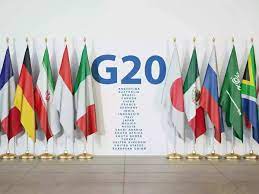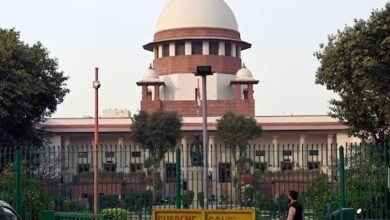G20 Reinvention: What Can India Contribute?
The summit had been seen as a significant achievement for the administration ever since India assumed the G20 chair in December of last year when Indonesia stepped down. India chose to make the G20 a huge celebration, something no other nation has done previously, even though the G20 has a rotating presidency. Because of how widely the event has been publicized, even the average Indians who are uninterested in global affairs are now aware that Prime Minister Narendra Modi is receiving significant world leaders. G20 cutouts have been plastered all over the country in every imaginable location for months.
In actuality, the festivities started the moment the Prime Minister unveiled the G20 emblem. From Srinagar to Guwahati, from Bangalore to Goa, and in locations like the Rann of Kutch and Khajuraho, with Lucknow, Jodhpur, and Thiruanthapuram thrown in, some 250 events were organized across 60 cities to give tourists a taste of the diversity that India has to offer. It has been a celebration focused on the community, with school and college students taking part in discussions and seminars on the numerous topics related to India’s presidency. Many Indians believe that the G20 will be a turning point that will catapult their country and Prime Minister Narendra Modi—the Vishwaguru—into the international spotlight. India feels that the moment has arrived for it to occupy its proper position on the international scene. India hopes to overtake China as the third-largest economy in the world over the next ten years. Its economy is thriving, and the Chandrayan mission has made it one of the chosen countries to send a mission to the moon successfully.
But is the G20 really that important? How significant is it in stabilizing the global economy and how does it compare to the G7, the strong forum for wealthy industrialized nations?
“The G7 may include some of the largest economies and most powerful nations on earth, but at its core, it is a Western bloc. The G20 is more reflective of the whole globe since it includes leading economies from the Global South. However, the G20 often fails to reach agreements because to the presence of so many conflicting and competing countries, particularly now at a period of intense great power rivalry, according to Michael Kugelman, Director of the South Asia Institute at the Wilson Center in Washington, DC.
In order to debate and coordinate economic policy, reserve bank governors and finance ministers first met as the G20, or Group of 20, in 1999. Argentina, Australia, Brazil, Canada, China, France, Germany, Greece, Italy, Japan, Republic of Korea, Mexico, Russia, Saudi Arabia, South Africa, Turkey, United Kingdom, United States, and the European Union are among the countries that make up the G20.
When the heads of state started to convene, first in reaction to the terrible 2008 financial crisis—which is seen as the greatest danger to the global economy since the Great Depression—the group developed into a more potent brand. In November 2008, during George Bush’s second term in office, the inaugural G20 Summit was held in Washington.
Since that time, the G20 has convened annually and has become considerably more political due to the participation of the heads of state. Especially so now that the conflict in Ukraine has split the globe into pro-US and pro-Russian factions. Most of the nations in the Global South, like India, seek to be neutral and wish to have a foothold in both camps. The whole scenario has become more difficult due to the competition between the US and China as well as India’s own issues with China. As if this weren’t enough, there is also the historical relationship between India and Russia and the anti-West China friendship between Russia and China.
Will the summit’s choices serve as a catalyst for change and aid in the development of a new global order? The world has been changing for a while. Nothing has yet been able to replace the liberal system that the World War II winners established, but it is shattered. The multi-polar world that New Delhi and other nations envision is still a long way off from becoming a reality. Despite a decrease, the US is still the sole superpower in the world. Even if China’s economy may not be doing as strongly as it once did, it is still the second-most significant economy. India is also not now in a position to compete with China and won’t be for at least another ten years. But India has big ideas for changing the world, beginning with expanding and reforming the G20 platform.
What benefits India offers the G20?
“No other nation has portrayed the G20 as we have. In a sense, India has rebuilt the G20, according to P S Raghavan, chairman of the National Security Advisory Board (NSAB). India has given the G20 new life, expanded its character and scope, and welcomed the Global South.
He acknowledges that the Ukraine war has reduced the political coherence of the G20 today, but India has moved beyond politics to argue that real progress cannot be made unless the issues facing the developing nations affected by both the Ukraine war and the Covid pandemic are urgently and jointly addressed.
With food and fertilizer shortages, interruptions in the supply chain, mounting debt, and inflation, developing countries are experiencing unprecedented economic hardship and are lagging behind in attaining the UN Sustainable Development Goals (SDGs). The damaged systems need to be fixed, and New Delhi wants to start the process.
“One Earth, One Family, One Future” is India’s G20 theme, which it borrowed from the Upanishads. The focus is on how the growth of all living things leads naturally to cooperation for addressing climate change and sustainable development. India has already started the process of winning over G20 states to its proposal to admit the African Union (AU) to the organization. If everyone else concurs, which is probable, the AU will join the group on an ongoing basis.
“India adds a degree of inclusivity to the G20 stage that is unmatched. India seeks to broaden the premier grouping’s perspective on important global economic problems by balancing the concerns of the rest of the world with the thinking of the big nations, according to Syed Akbaruddin, India’s former UN ambassador. India has interacted with more than 120 countries of the Global South. China and India are vying with one another to be the voice of the developing world. India is now far behind China in both Africa and Latin America.
“India is one of the world’s fastest-growing economies and, as a developing country represented in top international forums, a bridge to the Global South—though this is also a mantle claimed by Beijing—which heightens the competition between the two,” claims Kugelman. “India is also a crucial balancing force since it has positive ties with both the West and Russia. New Delhi will be hoping that this would assist it in reducing tensions inside the G20 and advancing the creation of a significant unified statement at the summit’s conclusion. However, he continues, “that will be easier said than done.
Though disagreements over Ukraine may make it challenging to reach an agreement on an outcome document, as Ian Hall, professor of international relations at Griffith University in Australia, puts it, “The real action in the G20 will be the conversations on women’s empowerment, science, climate change, and new technology, where conversations between G20 members and the Global South are a must.”
Discussion topics will include green development, climate financing, inclusive resilient growth, accelerating progress on the SDGs, technology transformation and digital public infrastructure, and women-led development. India is providing poor nations with access to its digital platform in order to duplicate and alter lives.
As Akbaruddin has said, India seeks to strike a balance between the concerns and demands of the Global South and the thinking of big economies in order to serve as a bridge between developed and developing countries.
“Like Vienna during the Cold War, Delhi is providing a neutral place. Through the Raisina Dialogue, Delhi has also supported this, said Hall. India’s advocacy of the Global South is supported by a number of nations. According to Hall, it will provide nations like Australia and Japan a forum to engage in dialogue with the underdeveloped countries.
For the G20, India has set a high standard. The ability of summit decisions to be effectively implemented on the ground will determine a lot of things. India would have done a lot if it could do that.







